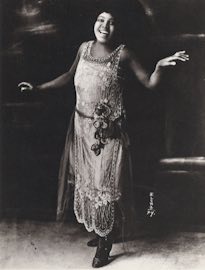At the age of nine, Bessie Smith was singing on the streets of Chattanooga, Tennessee. She joined a traveling vaudeville show as a dancer, but it was soon apparent that her singing talent outshone her dance ability.
Inspired by Gertrude “Ma” Rainey, Bessie found that her deep, soulful voice was ideally suited to the new blues music. She quickly became a favorite entertainer on the theater circuit. In 1923, Columbia Records issued her first recording, Down-Hearted Blues, which was a huge success. She was soon the highest paid black entertainer in the country. She composed many of her own songs, and when she sang the blues, she sang of the American Black experience – suffering and joy, betrayal and courage.
An extraordinary talent, Bessie was given the title “Empress of the Blues” by her fans and her peers. Off-stage, Bessie Smith was a volatile personality with a zest for life. She enjoyed her fame, spending freely without thought for the future. In the 1930s, however, the Great Depression and talking movies crippled vaudeville and nearly killed the recording industry. This was a difficult period for her, although she continued to work.
1937 Bessie Smith had begun to stage a successful comeback, adapting her powerful voice to the new swing music. While on tour, she was fatally injured in a car accident. The greatest blues singer of her time, she left a musical legacy that grew as her recording inspired later
performers.

